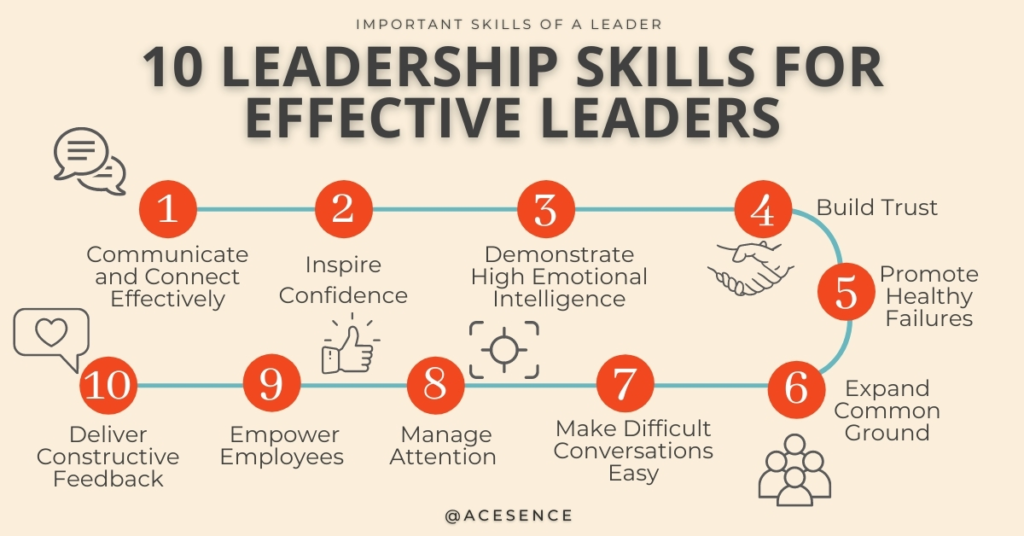Building leadership skills is essential for personal and professional growth. Effective leaders inspire and guide teams, drive organizational success, and navigate challenges with confidence. Developing these skills involves continuous learning, self-reflection, and practice. This article explores key strategies for building leadership skills, including understanding core competencies, seeking feedback, and applying practical techniques.

1. Understanding Core Leadership Competencies
Leadership skills encompass a range of competencies that contribute to effective leadership. Key competencies include:
- Visionary Thinking: The ability to set a clear vision and long-term goals. Visionary leaders inspire their teams with a compelling future direction and align efforts towards achieving that vision.
- Decision-Making: Making informed and timely decisions is crucial for leadership. This involves analyzing information, considering alternatives, and choosing the best course of action.
- Communication: Effective communication is vital for leading teams. It involves clear, concise, and empathetic communication, active listening, and the ability to convey ideas and expectations.
- Emotional Intelligence: Understanding and managing your own emotions and those of others. Emotional intelligence helps build strong relationships, manage conflicts, and navigate complex situations.
- Delegation: The ability to assign tasks and responsibilities effectively. Good delegation empowers team members, optimizes resources, and ensures that work is completed efficiently.
2. Seeking Feedback and Mentorship
Feedback and mentorship play a crucial role in developing leadership skills:
- Seek Regular Feedback: Actively seek feedback from colleagues, supervisors, and team members. Constructive feedback provides insights into your strengths and areas for improvement, helping you grow as a leader.
- Engage a Mentor: Find a mentor who can provide guidance, support, and perspective. A mentor offers valuable experience, advice, and can help navigate career challenges and opportunities.
- Participate in Leadership Assessments: Utilize leadership assessments and tools to gain a deeper understanding of your leadership style and areas for development. Assessments provide a structured approach to identifying strengths and weaknesses.
3. Developing Practical Leadership Techniques
Applying practical techniques can enhance your leadership effectiveness:
- Set Clear Goals: Define specific, measurable, achievable, relevant, and time-bound (SMART) goals. Setting clear goals helps you and your team stay focused and motivated.
- Build Strong Relationships: Invest time in building and maintaining relationships with team members. Strong relationships foster trust, collaboration, and a positive work environment.
- Lead by Example: Demonstrate the behaviors and values you expect from your team. Leading by example sets a standard for performance and behavior, inspiring others to follow suit.
- Encourage Innovation: Foster a culture of innovation by encouraging team members to share ideas and take calculated risks. Support creativity and experimentation to drive progress and improvement.
4. Embracing Continuous Learning
Leadership skills are not static; they require ongoing learning and adaptation:
- Pursue Professional Development: Engage in continuous learning through workshops, seminars, courses, and conferences. Professional development opportunities expand your knowledge and skills.
- Read Leadership Books: Explore books and articles on leadership to gain new perspectives and insights. Reading helps you stay informed about current trends and best practices in leadership.
- Reflect on Experiences: Regularly reflect on your leadership experiences, successes, and challenges. Self-reflection helps identify lessons learned and areas for growth.
5. Applying Leadership Skills in Real Scenarios
Applying leadership skills in real-world scenarios enhances their effectiveness:
- Lead Projects: Take on leadership roles in projects or initiatives. Leading projects provides hands-on experience in managing teams, making decisions, and achieving results.
- Resolve Conflicts: Practice conflict resolution by addressing and managing conflicts within your team. Effective conflict resolution strengthens relationships and promotes a collaborative environment.
- Mentor Others: Share your knowledge and experience by mentoring others. Mentoring provides opportunities to develop leadership skills while supporting the growth of others.
6. Overcoming Challenges in Leadership Development
Building leadership skills comes with challenges. Address these challenges by:
- Managing Self-Doubt: Overcome self-doubt by focusing on your achievements and strengths. Confidence grows with experience and reflection on your successes.
- Balancing Leadership and Management: Recognize the difference between leadership and management. Focus on developing both leadership and management skills to address various aspects of team and project management.
- Handling Resistance: Address resistance to change or new initiatives by communicating effectively and involving team members in the process. Understanding and addressing concerns helps gain buy-in and support.
Conclusion
Building leadership skills is a dynamic and ongoing process that involves understanding core competencies, seeking feedback, developing practical techniques, and embracing continuous learning. By applying these strategies and overcoming challenges, you can enhance your leadership effectiveness and drive success within your organization. Leadership development is a journey that requires commitment, self-awareness, and a willingness to grow and adapt.
Meta Description: Learn strategies for building leadership skills, including understanding core competencies, seeking feedback, applying practical techniques, and embracing continuous learning for effective leadership and organizational success.

